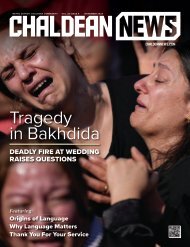Create successful ePaper yourself
Turn your PDF publications into a flip-book with our unique Google optimized e-Paper software.
Greektown Casino Guarantees<br />
You Will Always Find At Least Five Tables<br />
With A Minimum Bet Of Just $5<br />
24 Hours A Day / 7 Days A Week<br />
Even On The Weekends!<br />
1-888-771-4FUN (4386)<br />
•Over 80 Tables!<br />
•Over 2,300 Slots!<br />
•Largest Poker Room in Detroit!<br />
•Over 15 Restaurants in the Greektown District!<br />
Located in the heart of the Historic Greektown District<br />
555 East Lafayette Avenue, Detroit, MI 48226<br />
www.greektowncasino.com<br />
REFUGEES continued from 32<br />
Chaldeans have fled Iraq since 1988, dramatically<br />
increasing during Saddam Hussein’s regime. The<br />
estimated total ranges from 80,000 to 100,000<br />
individuals. And there have been many more people<br />
who have been silent in their departures. Most<br />
have taken refuge in Syria and Jordan, as well as<br />
Turkey, Lebanon and several European countries.<br />
There are many Chaldeans applying for asylum<br />
and refugee status. More than 1,200 cases have<br />
been received in the first wave of the committee’s<br />
efforts. One of the committee’s goals is to make the<br />
immigration process for refugee families easier and<br />
more effective. There are several steps in this<br />
application process.<br />
First, one must identify if the applicant is seeking<br />
asylum or refugee status. Immigrants applying<br />
for asylum file their application for refuge in the<br />
country that they occupy. Therefore, they have<br />
already settled in the country of refuge, but seek to<br />
obtain legal residency in that country. Those applying<br />
for refugee status are individuals who have fled<br />
or escaped their country of origin for fear of persecution.<br />
They are the applicants who wish to someday<br />
settle in the U.S., but are still in transit.<br />
Individuals seeking refugee status must select<br />
one of three dimensions that apply to their situation.<br />
The three dimensions, or criteria, include<br />
Priority 1 (P-1), Priority 2 (P-2) and Priority 3 (P-<br />
3). P-1 involves a referral in which an organization<br />
prepares a case on behalf of the individual and<br />
presents it to the State Department for referral and<br />
approval. P-2 pertains to the humanitarian need of<br />
individuals seeking admittance as a group. This<br />
process requires political support. P-3 is an application<br />
for family reunification, meaning that the<br />
applicant is seeking to be reunited with family<br />
members already settled in the U.S. Among the<br />
1,200 applicants, 85 percent claim they have at<br />
least one relative living in the U.S.<br />
THE FIRST WAVE<br />
The Committee on Immigration and Refugees has<br />
been working diligently to assist their first wave of<br />
applicants in obtaining official admittance to the<br />
U.S. Kassab said the arrival process is starting to take<br />
shape. “We do not have an exact timing as to when<br />
the refugees will arrive, but the interview processes<br />
are beginning,” Kassab said. Candidates must pass an<br />
interview and meet United Nations guidelines for<br />
refugee status before they will be able to settle in the<br />
U.S. Eligible candidates will be able to settle six<br />
months from the date of their interview. “We are<br />
starting to see light at the end of the tunnel,” Kassab<br />
said. “And we are continuing to see more light<br />
with every step of the process.”<br />
The committee’s efforts are indeed having an<br />
effect on the immigration process. P-1 applications<br />
had been severed for 3.5 years. However, due to the<br />
persistence of the committee and the thorough<br />
preparation of the cases presented to the Department<br />
of Homeland Security, P-1 has been reactivated.<br />
In the case of asylum status, most applicants<br />
have been denied in the past for many reasons. The<br />
committee persevered with the help of Senator<br />
Carl Levin, who introduced a bill to reverse the<br />
denials. Senate Bill S2611 has passed the first<br />
round of votes and will appear in front of Congress.<br />
There is much lobbying that needs to take place in<br />
order to pass this bill into law, but it has successfully<br />
made it through half of the process thus far.<br />
There are an additional 800 cases waiting to be<br />
processed for refugee status consideration. Those<br />
applicants will be considered Wave 2.<br />
Kassab remains enthusiastic about the future.<br />
“Christians are the flowers of Iraq,” he said. “They<br />
can truly grow and thrive here with the help of the<br />
community.”<br />
For more information on the Committee on Immigration<br />
and Refugees, visit http://www.chaldeanfederation.org.<br />
New forms are available, but only for those who have not<br />
already applied.<br />
YOU CAN HELP<br />
On December 1, the CFA will host an event at<br />
Shenandoah Country Club to celebrate its 25th<br />
anniversary. The fundraising dinner will include<br />
videos, photos and news from refugees and their<br />
families. Tickets are $250. Visit<br />
http://www.chaldeanfederation.org for details.<br />
50 CHALDEAN NEWS <strong>OCTOBER</strong> <strong>2006</strong>

















